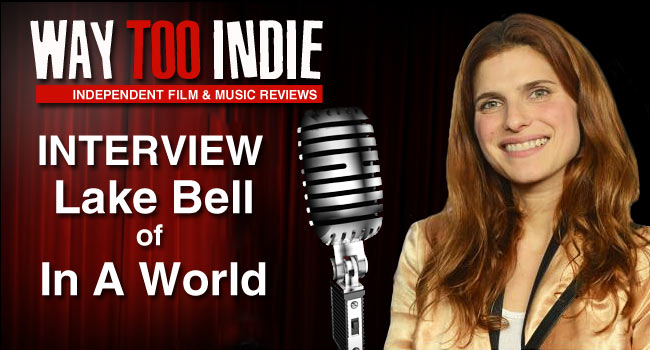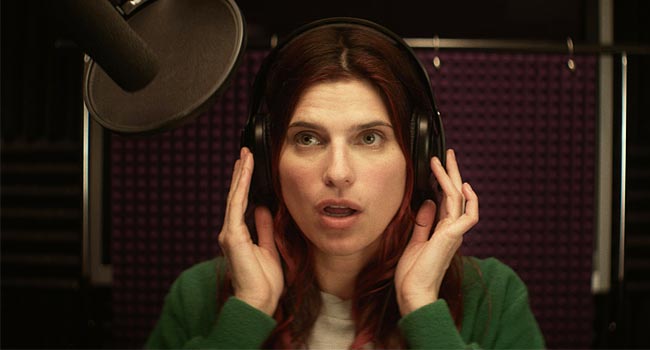Interview: Lake Bell of In a World

In Lake Bell’s (Childrens Hospital, No Strings Attached) directorial debut, In a World, she examines the complex relationships of a group of people involved in the ultra-exclusive world of voice acting. Bell sat with us to talk about why she’s so fascinated by accents, the “sexy baby” epidemic, what British people think of Americans, her writing process, and more.
In a World opens this Friday, August 16th.
The voice acting world serves as the framework for the film, but it’s not what the movie’s about.
Totally. It’s the umbrella.
Right. It’s not at the core of the film, but it’s obvious that voice acting is fascinating to you. What do you find so alluring about it?
I’ve always been interested in voice and sound—the mechanism, the muscles…the tool that it is. As a young girl, I thought accents and languages were mysterious, and people who had an accent were more sophisticated and interesting. I wanted to learn how to do them, and I had an ear for it. It was something I could do. My dad could do it, too. I started honing in on the skill, and my parents thought it was funny, so I ended up doing them a lot. I started hounding people about their accents and later, in drama school, started recording people and their accents. I collected accents like someone collects stamps. When I studied radio plays in England, the idea for characterization via this tool was really inspiring. It’s kind of the ultimate acting, because it’s without the judgment of what you look like, so people can’t say, “You’re too fat. You’re too thin. You’re too tall. You’re too brunette. You’re too blonde.” Anything. “You’re too female.” I could be a guy, I could be a different nationality, whatever.
And you do play a guy in the movie, right?
I do!
That’s something cool to have on the resume.
Totally! (laughs) I hope I get many more voiceover gigs. I love it so much. But yeah, it’s the blind voice, without judgment. You can be anybody.
I agree that people with accents are generally more mysterious and intriguing. You went to school in England. I have a feeling that they don’t find our American accents intriguing.
I would say in some parts of the world it is…maybe not mysterious (laughs) but it’s intriguing. I used to think the same thing. We don’t have a tremendously beautiful accent, but when I went to England, I was the only American in my college. We had people from Australia, we had people from Scotland, and all those people had to get rid of their accents and find a neutral accent of Received Pronunciation, or RP, which is basically BBC English. The Scottish and Australian people had to get rid of their accents to get to neutral, but I was also one of those people. I had this American accent that I had to get to neutral. I remember when they first said that to me I was shocked. I was like, “You guys have all the accents! I don’t know what you’re talking about.” As Americans, we’re so ethnocentric. We think that everybody else has the accents and we don’t, but in fact, I was just another foreign student that had an accent to get rid of. That was a nice role-reversal. I lived in France at one point and at first, even in England, everyone’s kind of tough on you for being American. They don’t want to make you feel like you’re special at all. They’re like, “Fuck you, we don’t care!” Then, you realize as you become friends with people that they’re so intrigued and so jazzed on American culture, and that made me feel less bad. Initially, when I’d move to different countries, I’d always be like, “Oh god, this is such a bummer. They hate me.”
So they don’t think we’re all jerks over there.
I mean…
They do! (laughs)
As a country, there are a lot of jerks here. When you see Americans when you’re traveling, don’t you think, “Oh god!” and put your hands on your head?
Totally. It’s embarrassing.
It is embarrassing. Too loud! What’s interesting about the American accent, just very technically, is that it’s more resonant, and therefore travels farther. So, the actual accent is louder than other accents.
Interesting. Is it the shapes we make with our mouths?
Yeah. The shapes we make, and where we place it in our mouths. Australians are the same way. They have a louder accent as well. Australian isn’t one of my accents, but [the sounds] are further back [in the mouth] and more resonant. It’s annoyingly louder than other ones. A British accent is quieter. A French accent is also very quiet. It’s just because it’s in the front of the mouth and not supported in the same way.
You’re obviously a whiz at this stuff. Is that why you chose to set the film in the voiceover world?
Sure. I had a lot to say about it.

And “sexy baby” as well! (“Sexy baby” is an incredibly annoying and idiotic American female accent that can be heard on numerous reality shows and in Nordstroms across the nation. It sounds exactly as the name implies—like a squeaky, high-pitched baby that wants to fuck you. It’s a monstrosity.)
Yeah, “sexy baby.” I’m haunted and offended by it.
But now you have to hear it all the time because you’re traveling with the movie!
It’s OK because it’s really fun traveling with the movie and being in all these airports and really seeing it everywhere in the nation. It’s not exclusive to California. Everyone says it comes from the valley, and it does, to an extent, originate there. But it has blossomed, or festered, I should say, into something that is so rampant and its own beast. It’s so unsavory for perfectly smart women to be speaking this way. It’s really bad when you hear mothers and wives taking it on to be sort of sexually relevant.
Wow, I’ve never heard mothers speak like that.
There are some reality shows where women in their 40’s talk like that.
Shows that shall not be named (laughs.) The movie is all about the characters and their relationships and interactions with one another. You didn’t want this to be a “voice actor movie”, right? You wanted to focus on the characters.
Correct. What I can speak to and what I feel like my forte is as a writer is to investigate the relationships and also not be on my soapbox, but definitely discuss cultural trends that apply to this woman finding her voice in a very real way, but also in an emotional way, and helping other girls find their voices and combating her father. It’s definitely a coming-of-age story that I felt needed a world that supported the comedic beats, but also was relevant in her journey. That’s why the voice actor world felt like the right place.
It fit.
Yeah, it fit beautifully for me. It’s also just something I like. I had a lot to say about it, I had a lot of characters in my head around it, I had a lot of interactions that I could envision happening, and it was colorful. Even if it’s just colorful in sound, there’s a multitude of angles and ways into the story.
Was the writing process pretty smooth? Was it quick?
I’d say it took a year-and-a-half to two years for the script to gestate and, you know, that’s 20-something drafts. Writing, for me—because I have the luxury of not having a deadline, being able to write when I want to write, what I want to write, and not doing it for anyone but myself—sometimes takes longer, however, the actual writing process is smooth, because I only arrive to write when I want to. When I’m writing, it’s on my own accord.
Let’s talk a bit about Fred Melamed.
He’s a great man. He’s a teddy bear. I’m so proud of his performance and his dedication to committing to that role and being despicable and tragic at the same time, and also, just delivering a hilarious, egomaniacal character.
When he starts crying it’s just amazing.
Oh my god. He’s so committed. It’s beautiful. So yeah, I’m thankful to him.
